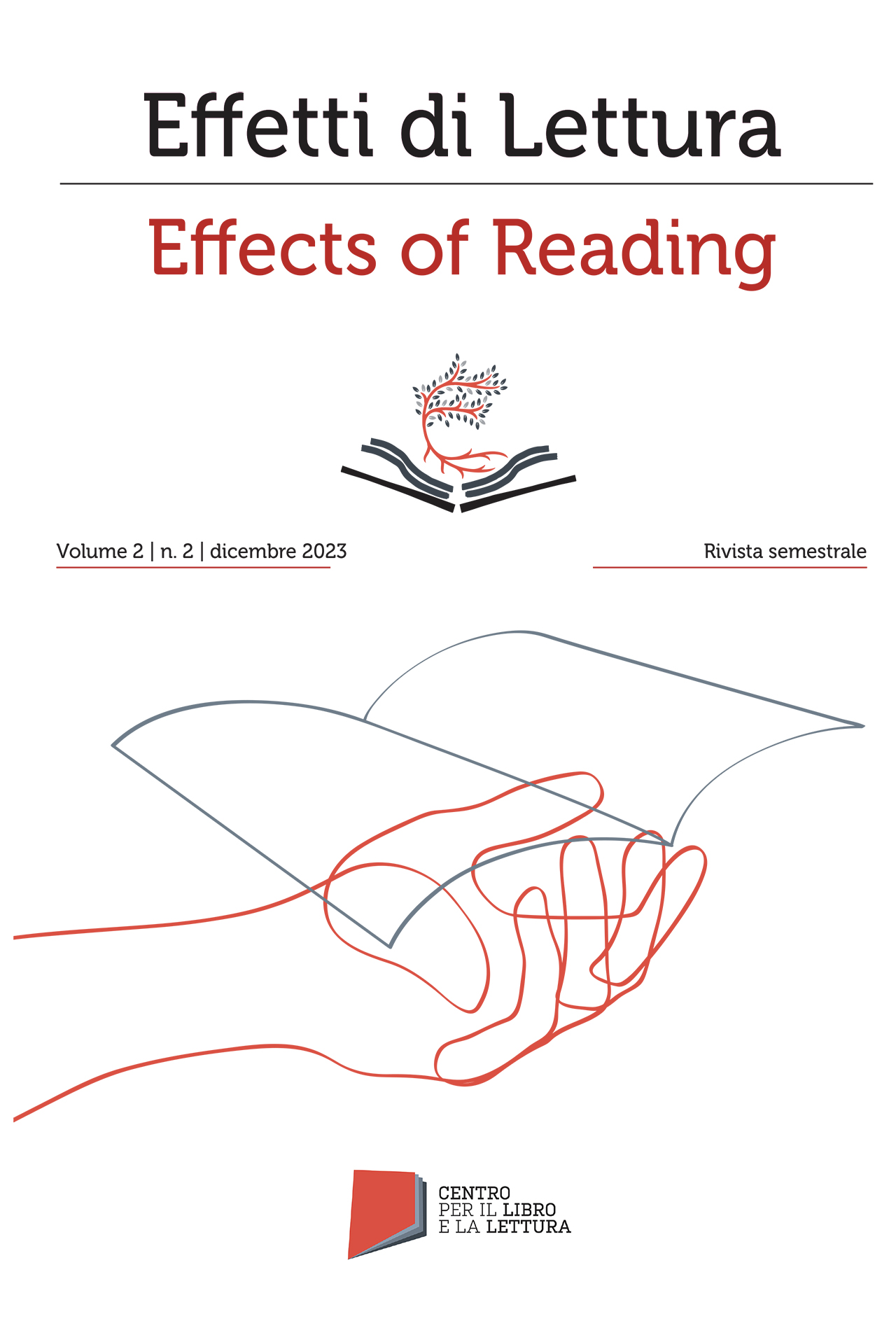Dialogic reading for the development of reflective thinking
DOI:
https://doi.org/10.7347/EdL-02-2023-01Keywords:
dialogic reading, community of thought, reflective thinkingAbstract
The contribution explores the use of dialogic reading in professional contexts. It investigates its potential and possible uses in relation to the development of reflective thinking of adults engaged in the professions. In this sense, it briefly illustrates the theoretical framework of reference, with particular regard to the construct of community of thought, a fundamental condition for the development of reflective thought with its characteristics of reciprocity, democracy and, indeed, dialogicality. It is precisely from the idea of the dialogicality of the community as logos, thought put in common – a condition for the transformation of reality and self-awareness, both in an individual and collective sense – that the hypothesis of the use of dialogical reading in professional contexts, whether ordinary, heuristic or educational, arises. For example, the community, as a group of speakers, through reflection on practices, described and noted down by professionals with special protocols, not only lays the foundations for the exchange of these practices and their improvement, but above all fosters awareness of one’s own motivations, conceptions, and the values underlying one’s actions, subjecting them to the critical scrutiny of thought and opening them up to third-level reflection, capable of transforming whatever is inadequate, outdated or limiting.
In the light of the same conception, the community use of the dialogical reading of theoretical texts, appropriately chosen, allows to trigger, in various forms and at various levels, a virtuous circularity between theory and praxis, capable of inspiring reflection about the conceptual generalization nec-essary for the true change of ideas.
In this sense, the contribution will return the results of the qualitative research The Reflective Teacher (Michelini M.C., 2016. Fare Comunità di pensiero. L’insegnamento come pratica riflessiva...
Downloads
References
Baldacci M. (2012). Trattato di pedagogia generale. Carocci.
Baldacci M. (a cura di) (2013). La formazione dei docenti in Europa. Bruno Mondadori.
Baldacci M. (2014). Per un’idea di scuola. Istruzione lavoro e Democrazia. FrancoAngeli.
Baldacci M., Nigris E., Riva M.G. (2020). Idee per la formazione degli insegnanti. FrancoAngeli.
Bateson G. (1986). Verso un’ecologia della mente. Adelphi, 1972.
Batini, F. (2022). Il futuro della lettura ad alta voce. Alcuni risultati della ricerca educativa internazionale. Carocci.
Bruner J. (2003). La ricerca del significato. Bollati Boringhieri (1992).
Dewey J. (1933), Come pensiamo. La Nuova Italia 2006.
Dewey J. (2000). Democrazia e educazione. La Nuova Italia, (1916).
Dewey J. (1951). Le fonti di una scienza dell’educazione. La Nuova Italia Editrice, 1929.
Dewey J. (1949). Scuola e società. Firenze: La Nuova Italia, 1899.
Foucault M. (2012). Sull’origine dell’ermeneutica del sé. Cronopio.
Freire (1971). La pedagogia degli oppressi. Arnoldo Mondadori Editore.
Michelini M.C. (2013). Educare il pensiero. Per la formazione dell’insegnante riflessivo. FrancoAngeli.
Michelini M.C. (2016). Fare Comunità di pensiero. Insegnamento come pratica riflessiva. FrancoAngeli.
Michelini M.C. (2020). Il concetto di formazione nei documenti dell'Unione Europea. In M. Baldacci e E. Colicchi (eds.). I concetti fondamentali della Pedagogia. Educazione Istruzione Formazione (pp. 248-261). Avio Edizioni Scientifiche.
Michelini M.C. (2016). Il pensiero Riflessivo. In M. Baldacci e E. Colicchi (eds.).Teoria e prassi in pedagogia. Questioni epistemologiche (pp. 241-258). Carocci.
Michelini M.C. (2018). Per una pedagogia critica delle buone prassi. FrancoAngeli.
Margiotta U. (2015). Teoria della formazione. Carocci.
Mezirow J. (2003). Apprendimento e trasformazione: Il significato dell’esperienza e il valore della riflessione nell’apprendimento degli adulti. Raffaello Cortina (1991).
Mezirow J. (2007), Adult Education and Empowerment for Individual and Community Developmet in Radical learning for liberation 2, MACE (Maynooth Adult and Community Education).
Nussbaum M. C. (2012). Creare capacità. Liberarsi dalla dittatura del PIL. il Mulino.
Pellerey M. (1999), Educare. Manuale di pedagogia come scienza pratico-progettuale, LAS.
Pourtois J.P. (1986), La ricerca-azione in pedagogia, in Becchi E., Vertecchi B. Manuale critico della sperimentazione e della ricerca educativa, Franco Angeli, pp. 134-155.
Quaglino G.P. (2011). La scuola della vita. Manifesto della terza formazione. Raffaello Cortina.
Schön D.A. (1993). Il professionista riflessivo – per una nuova epistemologia della pratica professionale. Dedalo (1983).
Schön D.A. (2006). Formare il professionista riflessivo – per una nuova prospettiva della formazione e dell’apprendimento nelle professioni. FrancoAngeli.
Vygotsky L. S. (1956). Pensiero e linguaggio. Giunti.
Watzlawick P., Weakland J. H., Fisch R. (1974). Change – sulla formazione e la soluzione dei problemi. Astrolabio.
Wenger E. (1998). Comunità di pratica. Apprendimento, significato e identità. Raffaello Cortina. 2006.
Downloads
Published
How to Cite
Issue
Section
License
Copyright (c) 2024 Effetti di lettura / Effects of reading

This work is licensed under a Creative Commons Attribution-NonCommercial 4.0 International License.








